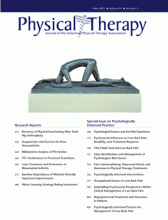Abstract
Background Psychosocial prognostic factors are important in the development of chronic pain, but treatment providers often lack knowledge and skills to assess and address these risk factors.
Objective The aim of this study was to examine the effects on outcomes (pain and disability) in patients of a course about psychosocial prognostic factors for physical therapists.
Design This study was a randomized, controlled trial.
Setting The setting was primary care practice.
Participants Forty-two primary care physical therapists attended an 8-day university course (over 8 weeks) aimed at identifying and addressing psychosocial risk factors.
Intervention The physical therapists were randomly assigned to either the course or a waiting list. They treated consecutive patients with acute and subacute musculoskeletal pain both before and after the course.
Measurements We measured physical therapists' attitudes and beliefs about psychosocial factors, knowledge, and skills before and after the course. We measured patients' pain, disability, catastrophizing, and mood at the start of treatment and at a 6-month follow-up.
Methods The physical therapists were randomly assigned to either the course or a waiting list. They treated consecutive patients with acute and subacute musculoskeletal pain both before and after the course.
Results Pain and disability outcomes in all patients of physical therapists who had participated in the course or in patients at risk of developing long-term disability who had higher levels of catastrophizing or depression were not significantly different from those outcomes in patients of physical therapists who had not participated in the course. Pain and disability outcomes in patients with a low risk of developing long-term disability—and pain outcomes in patients with a high risk of developing long-term disability—were not dependent upon whether the attitudes and beliefs of their physical therapists changed during the course. However, disability outcomes in patients with a high risk of developing long-term disability may have been influenced by whether the attitudes and beliefs of their physical therapists changed.
Limitations A limitation of this study was that actual practice behavior was not measured.
Conclusions An 8-day university course for physical therapists did not improve outcomes in a group of patients as a whole or in patients with a risk of developing long-term disability. However, patients who had a risk of developing long-term disability and had higher levels of catastrophizing or depression may have shown greater reductions in disability if the attitudes and beliefs of their physical therapists changed during the course.
Footnotes
Dr Overmeer, Dr Denison, and Dr Linton provided concept/idea/research design. Dr Overmeer, Dr Boersma, and Dr Linton provided writing and data analysis. Dr Overmeer provided data collection. Dr Overmeer and Dr Linton provided project management and fund procurement. Dr Denison provided participants, facilities/equipment, and consultation (including review of manuscript before submission). The authors thank Ing-Liss Bryggelsson for her help in the statistical analysis.
The Regional Ethical Committee at Uppsala University approved this study.
The Department of Occupational and Environmental Medicine at Örebro University Hospital funded this research.
This trial is registered at ClinicalTrials.gov with identifier NCT00902642 (protocol M-127).
- Received March 3, 2010.
- Accepted October 7, 2010.












